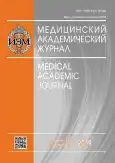STRESS-PROTECTIVE ACTION OF THYMUS PEPTIDES CONCERNING AGING RATS
- Authors: Korolev AG1, Novoseletskaya AV1, Kiseleva NM2
-
Affiliations:
- Higher Nervous Activity Department, Biological Faculty, Federal State Budgetary Educational Institution of Higher Education Lomonosov Moscow State University
- Pharmacology Department, Pirogov Russian National Research Medical University, Moscow
- Issue: Vol 19, No 1S (2019)
- Pages: 170-172
- Section: Articles
- Published: 15.12.2019
- URL: https://journals.eco-vector.com/MAJ/article/view/19383
- ID: 19383
Cite item
Abstract
The survey objective is to check stress-protective action of thymus peptides concerning aging rats, experimentally. Methods used to study anxiety state were applied in tests with 18-months rats. It was found that thymus peptides in elevated plus maze (Thymosin fration 5 (0.5 mg/kg) and Thymulin (0.15 mg/kg)), and anxiolytic Diazepam (0.5 mg/kg) increased the motion activity in open arms, and number of positions onto hind legs in the light part of dark-light chamber. Influence of thymus peptides on the emotional stress associated with the failure of formated conditioned response of active avoidance was studied among aging rats. Within the control the failure caused a sharp decline in avoidance reactions and other demonstration of emotional tension. Thymus peptides and Diazepam prevented negative consequences on avoidance learning reactions. Thus, thymus peptides have demonstrated effect comparable to Diazepam in used models conditions. In avoidance learning model thymus peptides entirely prevented the consequences of emotional stress in ageing rats.
Full Text
About the authors
A G Korolev
Higher Nervous Activity Department, Biological Faculty, Federal State Budgetary Educational Institution of Higher Education Lomonosov Moscow State University
A V Novoseletskaya
Higher Nervous Activity Department, Biological Faculty, Federal State Budgetary Educational Institution of Higher Education Lomonosov Moscow State University
N M Kiseleva
Pharmacology Department, Pirogov Russian National Research Medical University, Moscow
References
- Inozemtsev AN, et al. Comparative analysis of the effect of nootropic agents of different chemical structures on impaired avoidance reaction. Exp. and clinic. pharmacol. 1995;58(3):15-16.
- Inozemtsev AN, Pragina LL. Reversible violation of the avoidance reaction as an experimental model for studying the action of psychotropic drugs on higher nervous activity. Zh. High. nerv. activ. 1989;39(4):764-766.
- Kiseleva NM, et al. Effect of tactivin on functional disturbances in avoidance reaction in rats. Bull. of Exp. Biol. and Medicine. 2009;147(1):70-72.
- Kiseleva NM, et al. The mechanism of action of thymus-derived polypeptide (T-ACTIVIN) in experimental emotional stress model: a neurochemical study. Vestnik RUDN, Medicine series. 2011;4:143-148.
- Novoseletskaya AV. Mnemotropic properties of immunomodulators Derinat and Tactivin: extended abstract of dissertation. ... Ph.D, Biology: 03.03.01, 14.03.06. М.; 2011. 24 p.
- Simonov PV. Emotional brain. М.: Science; 1981. 191 p.
- Whishaw IQ, Haun F, Kolb B. Analysis of behavior in laboratory rodents. In: Modern techniques in neuroscience. Eds. Windhorst U., Johansson H. Berlin: Springer-Verlag; 1999. P. 1243-1268.
Supplementary files







